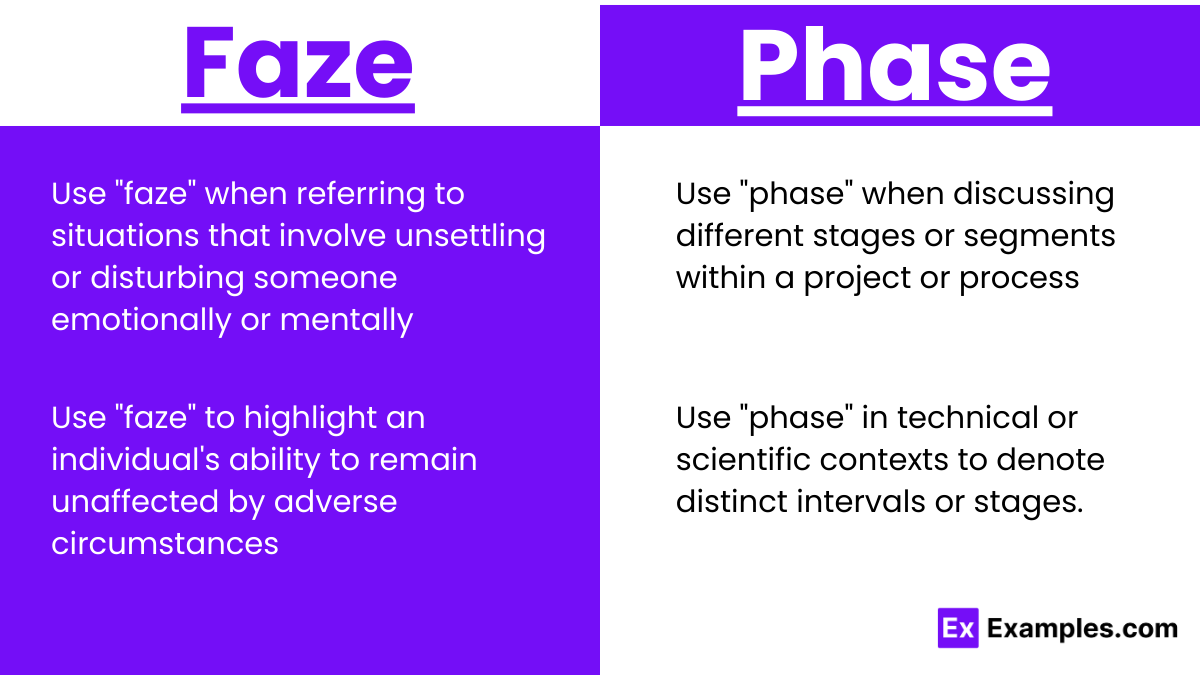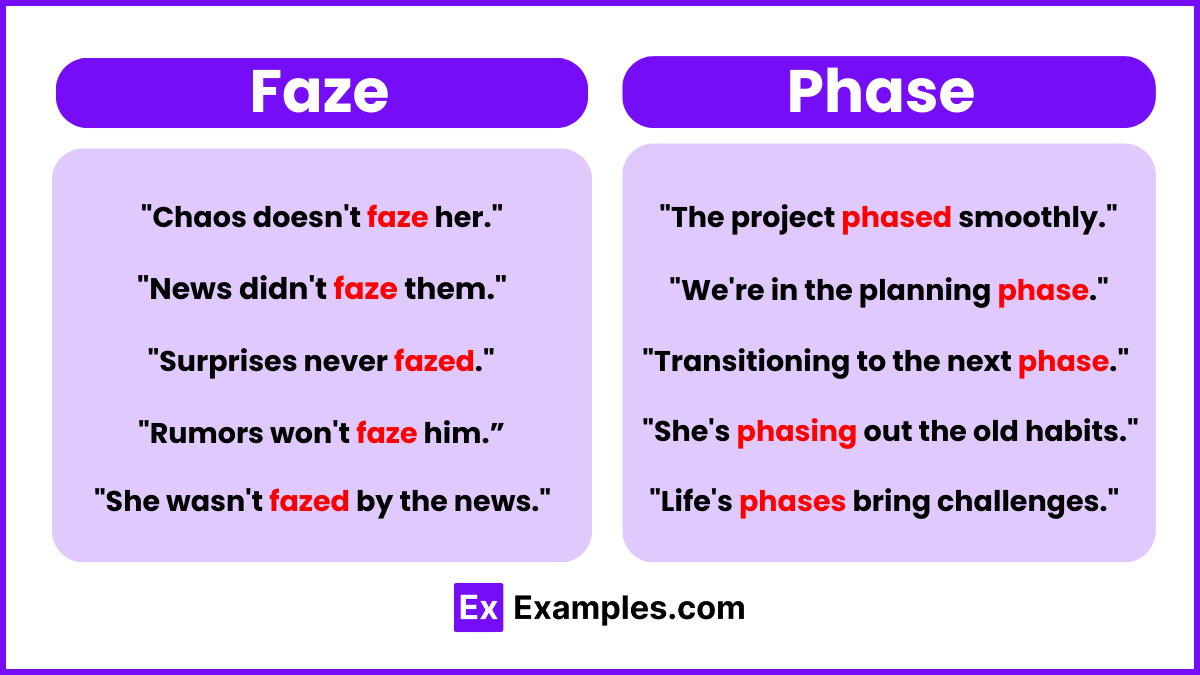Faze vs Phase – Meanings, Differences, Usage, Examples
“Faze” and “Phase” are similar-sounding words but have distinct meanings. “Faze” means to bother or disturb, like when something embarrassing happens. For instance, your princess phase lasting too long might faze your family. On the other hand, “Phase” refers to a stage in a process, or gradually introducing or removing something. So, while faze disrupts, phase moves forward.
Faze and Phase – Meanings
- Faze : It is a verb that means to disturb, bother, or unsettle someone. It’s when something unexpected or uncomfortable happens, causing a person to feel surprised or embarrassed. In simpler terms, to be fazed is to be thrown off or made uncomfortable by something unexpected.
- Phase : It is both a noun and a verb. As a noun, it refers to a particular stage or step in a process or development. For example, in a project, you might go through different phases like planning, execution, and evaluation.As a verb, it means to introduce or remove something gradually. In simple terms, a phase is a step in a process or the gradual introduction or removal of something.
Summary
How To Pronounce Faze and Phase
- Faze: Pronounced as “fayz” / “/feɪz/“. The ‘a’ in “faze” is pronounced like the ‘a’ in “day” or “haze”.
- Phase: Pronounced as “fayz” / “/feɪz/“. The ‘a’ in “phase” is also pronounced like the ‘a’ in “day” or “haze”.
Faze and Phase – Differences
| Aspect | Faze | Phase |
|---|---|---|
| Grammatical Class | Verb | Noun,Verb |
| Emotional Impact | Pertains to emotional response | Typically devoid of emotion |
| Duration | Momentary disturbance | Longer-term segment or stage |
| Subject Focus | Individual’s reaction | Process or project |
| Context | Psychological or emotional | Organizational or systematic |
How To Remember The Difference Between Faze and Phase
- “Faze” is like a “haze” of emotions — it clouds your feelings. Remember it as the emotional response to something unexpected or uncomfortable.
- “Phase” is like a stage in a play — it signifies a specific step or stage in a process. Think of it as a gradual progression or change.
Tricks to Remember The Differences Between Faze and Phase
-
Emotional Focus:
- “Faze” is about feelings (starts with “F“).
- “Phase“ is about progress (starts with “P“).
-
Visual Associations:
- Picture a confused face for “faze” and a series of steps for “phase.”
-
Mnemonic Phrases:
- “Faze = Feelings Are eagerly Expressed.”
- “Phase = Progress Happens, A Series Evolves.”
-
Word Pairing:
- Pair “faze” with emotionally charged words.
- Pair “phase” with terms related to structure or progression.
- Practice:
- Use both words in sentences to reinforce their meanings.
When To Use Faze and Phase

Usage of Faze
- Emotional Disturbance: Use “faze” when referring to situations that involve unsettling or disturbing someone emotionally or mentally.
- Reaction to Challenges: Employ “faze” when describing how someone responds to difficulties or obstacles.
- Personal Resilience: Use “faze” to highlight an individual’s ability to remain unaffected by adverse circumstances.
Usage of Phase
- Project Management: Use “phase” when discussing different stages or segments within a project or process.
- Temporal Sequences: Employ “phase” when referring to specific periods or stages in a sequence of events.
- Scientific and Technical Discussions: Use “phase” in technical or scientific contexts to denote distinct intervals or stages.
How To Use Faze and Phase
Faze:
- Use “faze” when describing someone being disturbed or unsettled emotionally.
- It’s typically used as a verb to indicate an emotional reaction.
Phase:
- Use “phase” when referring to a distinct period or stage within a process.
- It’s commonly used as a noun to denote a specific part of a sequence or process.
Faze and Phase – Examples

Faze:
- The loud noises outside don’t faze her; she remains focused on her work.
- Despite the criticism, she wasn’t fazed and continued her efforts.
- The challenging situation is not fazing him; he’s handling it well.
- She seemed unfazed by the sudden turn of events.
- No matter what happens, I won’t let it faze me; I’ll stay determined.
Phase:
- We’re currently in the planning phase of the project.
- The project phased through various stages before completion.
- The construction project is phasing into its final stage.
- She has phased through different careers before finding her passion.
- By next month, we’ll be phasing into the implementation stage of the plan.
Synonyms for Faze and Phase
| Faze | Phase |
|---|---|
| Disturb | Stage |
| Upset | Period |
| Rattle | Step |
| Disconcert | Segment |
| Unsettle | Aspect |
Exercises
Q 1. The loud thunder didn’t seem to ________ her concentration.
Q 2. The construction project is moving into its final ________.
Q 3. Despite the unexpected setback, she wasn’t ________ and continued with determination
Q 4. We’re currently in the planning ________ of the project.
Q 5. She’s entering a new ________ in her career, pursuing further education opportunities.
Answer
A 1. faze
A 2. phase
A 3. faze
A 4. phase
A 5. phase
FAQ’S
Is it fazed or phased?
“Fazed” refers to being disturbed or unsettled, while “phased” denotes stages or periods. Example: She wasn’t fazed by criticism; the project phased smoothly.
Is it faze through or phase through?
It’s “phase through.” This implies progressing through stages. Example: The project phased through planning, development, and implementation stages successfully.
Is it faze out or phase out?
It’s “phase out.” This means gradually replacing or discontinuing. Example: The company plans to phase out outdated technology over the next year.
When did faze become a word?
“Faze” originated in the early 19th century, denoting disturbance. It gained usage over time, becoming a recognized word in English.
It doesn’t faze me or phase me?
The correct phrase is “it doesn’t faze me.” “Faze” means to disturb or disconcert, while “phase” refers to a stage or step in a process. So, when you say “it doesn’t faze me,” you’re indicating that something doesn’t bother or disturb you.



